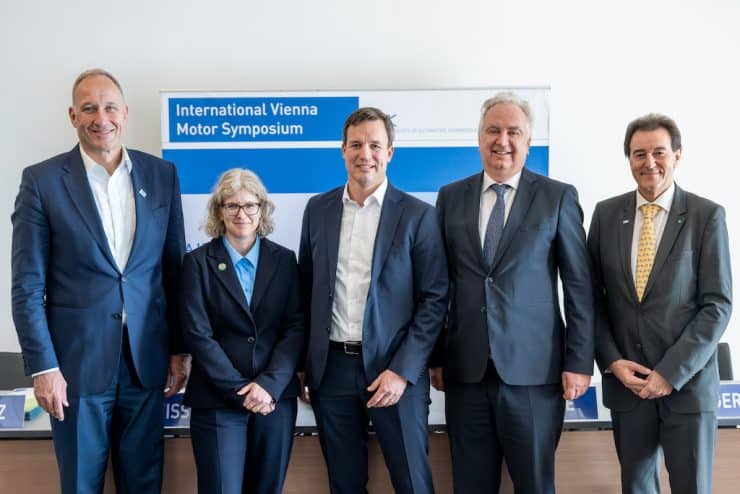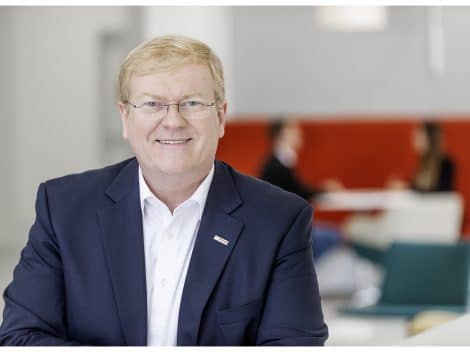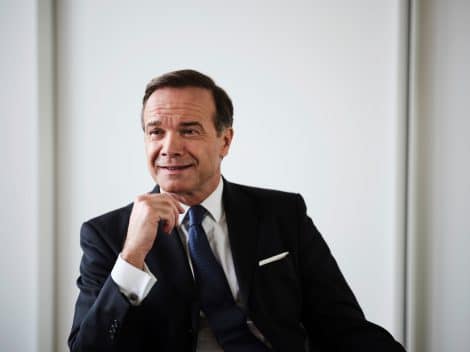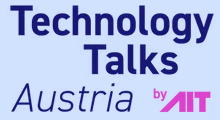International leaders from the world of industry and science gathered together in Vienna at the 45th International Vienna Motor Symposium to share their views on energy issues and their consequences for the development of alternative powertrains.
While electric vehicles and their impact on climate targets still dominate the headlines, an increasing number of vehicle manufacturers, energy experts, and suppliers are united in the view that isolated technical solutions will not suffice to push GHG emissions toward net-zero by 2050. At the opening of the International Vienna Motor Symposium, world leaders in the automotive industry talked about strategic approaches to reaching net zero. Among the topics discussed by the high-profile participants, including Bernhard Geringer, President of the Austrian Society of Automotive Engineers (ÖVK), Michael Fleiss, CEO of Aurobay Europe, Arnd Franz, Chairman of the Management Board and CEO of the MAHLE Group, Karl Rose, former Chief Strategist at ADNOC and Rebecca Yates, Vice President Advanced Lubricants Products at bp, were new hydrogen powertrain models and new sustainable potential energy sources.
“The energy transition offers both opportunities and challenges for the future of mobility and fuel systems”, said Karl Rose, former Chief Strategist of ADNOC in the United Arab Emirates. “For example, on one hand the world is, for the first time, on track for a peak in all fossil fuels before the end of the decade. On the other hand, I believe that after 2030, some of the regulatory requirements for Sustainable Aviation Fuels will prove too ambitious, and so we will have to adapt to what is feasible. The rising volumes of biofuels required as we work towards a goal of climate neutrality could also mean that we will once again have to grapple with serious social debates on topics like ‘food versus fuel’ and ‘developed countries versus emerging economies’. Regardless of our efforts, in some areas we will run out of feedstock sooner than we would like to.” According to Rose, the transition to electrified mobility requires major investments in infrastructure, grid capacity, and battery manufacturing, raising questions about supply chains and scalability to meet the rising demand: “We need quick reactions to the evolving situation and flexible development approaches to achieve the long-term goal of net zero emissions.”
Those who have the energy will win the race
The powertrain and vehicle industry has already taken important steps toward sustainability by developing and using alternatives to fossil fuels. Bernhard Geringer, the organiser of the International Vienna Motor Symposium, emphasised, however, that the energy issue must always be at the centre of all those innovations. According to Geringer, “those who have the energy will win the race. The greatest challenge will be to cover the rising demand for sustainable energy, either to power electric vehicles or to produce synthetic fuels, while minimising the negative impact on the environment. However, the availability of green electricity must be prioritised over the entire powertrain debate and the promotion of individual solutions.”
Innovative solutions are required for decarbonising the transport sectors evolving energy mix
“bp is developing a range of products and solutions to meet the evolving energy mix as transportation decarbonises”, said Rebecca Yates, Vice President Advanced Lubricants Products at bp. “We will continue to develop and scale these to meet energy demands of future low carbon mobility. Lubricants also play a vital role in ensuring optimal performance across all powertrains and also reflect our dedication to embracing a circular approach. As we continue to scale and adapt, our commitment remains steadfast to meeting the demand for low-carbon solutions in the ever-changing landscape of transportation.”
CEO of Aurobay Europe, Michael Fleiss also called for a global approach toward decarbonisation of the transport sector. “Global collaboration is indispensable in achieving net zero emissions. While electrification remains a viable option, many OEMs and experts have come to realise that a single solution will not suffice if we want and need to curb emissions so dramatically by 2040. Our global powertrain activities will bridge the gap between legacy systems and cutting-edge technologies. We need to work together to ensure that tomorrow’s mobility is accessible to everyone, regardless of geographic location, infrastructure, or availability of resources.”
Arnd Franz, Chairman of the Management Board and CEO of the MAHLE Group, identified the need for a multipath powertrain strategy as the most efficient approach to a quick decarbonisation of the mobility and transportation sector: “Battery-electric vehicles alone will not be sufficient to achieve climate targets. We also need sustainable internal combustion engines that can be operated with renewable fuels. Especially – but not only – in less populated economies and for many applications in the commercial vehicle sector, internal combustion engines will remain the technology of choice for the foreseeable future. In addition to battery-powered electric vehicles, high-efficiency engines capable of running on e-fuels, hydrogen, or other non-fossil fuels will contribute to a faster reduction of the carbon footprint of mobility.”
International Vienna Motor Symposium from 24 to 26 April
The conference in the Vienna Hofburg was attended by more than 1,000 experts from around the world. Some 80 speakers discussed topics such as the coexistence of different powertrain systems (i.e. electric motors, fuel cells, and internal combustion engines), or energy sources like e-fuels, hydrogen or electricity. A number of speeches addressed storage systems such as batteries and hydrogen solutions. The high-level conference programme was accompanied by an exhibition showcasing the latest technologies and developments by automobile manufacturers and their suppliers.
This year’s high-calibre speakers in the Vienna Hofburg included Friedrich Eichler, Chief Technology Officer at CNH Industrial Österreich GmbH Michael Fleiss, CEO of Aurobay Europe (Volvo/Geely) Arnd Franz, Chairman of the Management Board and CEO of the MAHLE Group, Helmut List, CEO of AVL List GmbH, Karl Rose, former Chief Strategist at ADNOC, Michael Steiner, Head of Research and Development of the Volkswagen Group and Rebecca Yates, Vice President Advanced Lubricants Products at bp.








